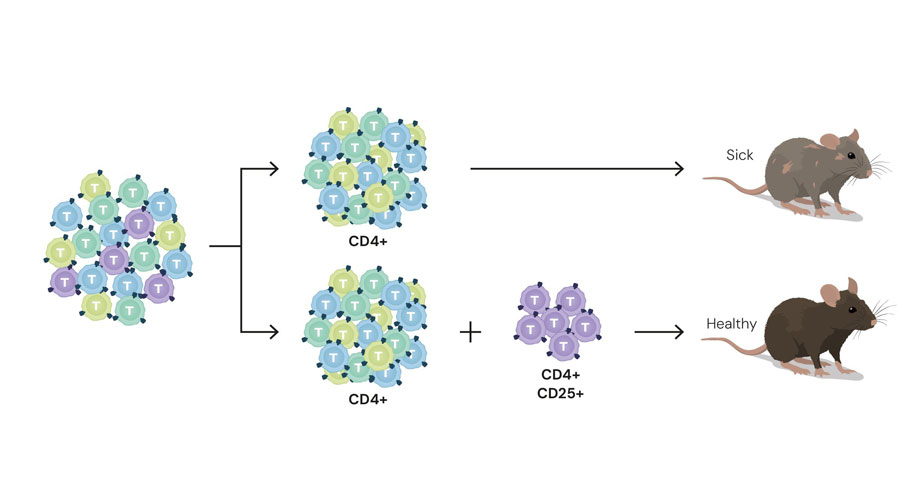
Sakaguchi defined a new class of T cells by showing that the T cells with CD25 on their surface protected against autoimmune diseases through an experiment in mice that lacked T cells. If he injected CD4-bearing T cells into the mice, but removed all the cells with CD25, the mice developed serious autoimmune diseases. If he added CD25-bearing cells, the mice remained health. Credit: © The Nobel Committee for Physiology or Medicine. Ill. Mattias Karlén
Former Scripps Research assistant professor awarded 2025 Nobel Prize in Physiology or Medicine
Shimon Sakaguchi is honored for his revolutionary discovery of regulatory T cells—revealing how “immune tolerance” impacts autoimmune diseases, cancer and more.
October 06, 2025
LA JOLLA, CA—Former Scripps Research assistant professor Shimon Sakaguchi has been awarded the 2025 Nobel Prize in Physiology or Medicine for his groundbreaking discovery of peripheral immune tolerance, a mechanism of the immune system that prevents autoimmune diseases and sheds light on how cancer escapes immune detection.
Sakaguchi, who was an assistant professor at Scripps Research from 1989 to 1991, shares the prize with Mary E. Brunkow of the Institute for Systems Biology in Seattle and Fred Ramsdell of Sonoma Biotherapeutics in San Francisco. They are being recognized for their contributions to uncovering several key functions of the immune system, according to the Nobel Prize committee.
“The discovery of regulatory T cells by Professor Shimon Sakaguchi and coworkers revealed a major unknown fundamental mechanism for peripheral immune tolerance that has significant implications for autoimmunity, cancer, other inflammatory diseases and ongoing therapies,” says Howard Hang, chair of the Department of Immunology and Microbiology at Scripps Research. “We were fortunate to have Sakaguchi as an assistant professor at Scripps Research and we are pleased to congratulate him, the other Nobel laureates and their colleagues on their transformative discovery, which is poised to have a major impact on human health.”
Sakaguchi made his landmark discovery in 1995 while working at the Aichi Cancer Center Research Institute in Japan, after returning from his tenure at Scripps Research. At a time when the scientific community believed that immune tolerance developed solely through the elimination of harmful immune cells in the thymus, Sakaguchi took a different approach. Through meticulous experimentation, he identified a previously unknown class of T cells—regulatory T cells, or “Tregs”—that actively monitor and control other immune cells to prevent autoimmune disease, and, when dysregulated, can allow cancer cells to evade immune attack.
“Their discoveries have been decisive for our understanding of how the immune system functions and why we do not all develop serious autoimmune diseases,” stated Olle Kämpe, chair of the Nobel Committee.
The immune system protects the body from thousands of pathogens daily, but it must distinguish between foreign invaders and the body’s own cells. When this system fails, autoimmune diseases such as rheumatoid arthritis, type 1 diabetes and multiple sclerosis can develop—or, conversely, the immune system may become overly tolerant, enabling tumor growth. Sakaguchi’s regulatory T cells act as the immune system’s “security guards,” ensuring that immune responses remain balanced and preventing both self-destruction and unchecked cell division.
The identification of regulatory T cells launched a new field of peripheral immune tolerance research and has directly inspired novel therapeutic approaches. Several treatments based on manipulating regulatory T cells are currently undergoing clinical trials for cancer, autoimmune diseases and transplant complications.
Sakaguchi obtained his MD in 1976 and PhD in 1982 from Kyoto University in Japan, where he trained as a pathologist and immunologist. After postdoctoral studies at Johns Hopkins University and Stanford University as a Lucille P. Markey Scholar, he joined Scripps Research in 1989. He returned to Japan in 1991 and continued his immunology research, holding positions at the Tokyo Metropolitan Institute of Gerontology and Kyoto University before becoming a Distinguished Professor at Osaka University’s Immunology Frontier Research Center, where he remains today.
In addition to the Nobel Prize, Sakaguchi has received numerous awards and honors for his pioneering work, including the prestigious Gairdner Foundation International Award.
Two current Scripps Research professors have been honored with Nobel prizes in recent years: Ardem Patapoutian with the prize in physiology or medicine in 2021; and Barry Sharpless with the prize in chemistry in 2022 (his second Nobel).
For more information, contact press@scripps.edu

